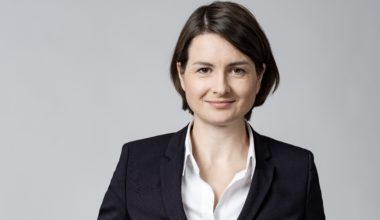In our third installment of the #MiMini exclusive series in partnership with TOC Digital, I’ve ceded the “host” seat back into the capable hands of INFORM’s Dirk Schlemper to interview me, Matthew Wittemeier, Marketing Manager at INFORM.

DS: How did you start working in the maritime industry and, more importantly, what attracted you to the industry?
MW: That’s a good question. I guess to start, I work in the industry as a vendor on the software supply side. INFORM is a software company that supplies add-on AI and optimization modules to the container terminal and port industry. I ended up at INFORM by accident. I was originally working in aviation IT, and INFORM has a large aviation division. While I would have loved to work there, the stars didn’t align for me, but I did find my way into the logistics division and have since fallen in love with port and terminal operations.
DS: Great! So, when did you start moving into the maritime industry?
MW: That was almost four years ago when I joined the team here at INFORM.
DS: Okay, so you came into an existing team. What was it like to integrate yourself into this team and into this new industry?
MW: Well, considering you’re part of my, or rather, our team, I’ll have to choose my words carefully. I did join an existing team, which included many others besides just you and me. There are some additional marketing personnel and, as well, we’ve got a broader sales team that we work with quite closely. Beyond that, I engage with the technical teams often throughout the course of my work.
In our direct team, it’s no secret, because you hosted the Millennials in Maritime panel last year, that you’re in your early fifties, a good old Boomer. When I started, we were doing a lot of things very traditionally. Is that fair to say?
DS: Yes.
We produced mainly brochures, lots of printed stuff. It was quite a journey to convert us more into a digital-first organization. I think the core of the idea and the messaging was really spot on, and it was just a matter of bringing it into the digital realm.
If we look beyond our team in the marketing role, it took a lot of work to integrate with some of those more senior members of our team who definitely are Boomers and understand how they work, what their processes are and trying to adopt those into my working process, which are, to say the least, quite different. I think the trick to that, of course, was compromising a bit on what my working processes were, but as well, there’s been a lot of compromise from their side to adopt to my approaches, also.
DS: So, looking back at the four years you’ve been in the industry now, who, in your mind, has changed more? The Boomers you’re working with, are they now more “millennial”? Or have the millennials ended up with more Boomer-style thinking?
MW: In my opinion, millennials bring new lines of thinking, but there is much wisdom and knowledge that you can glean and learn from the older people in a company and throughout our entire industry. I’m going to tackle this in two parts. I’m going to look at INFORM as a microcosm, and then I’ll take a more macro look at our industry.
As a company, I’ve already noted that there has been compromise on both sides. I think the Boomers within our organization, like you and Eva Savelsberg, our SVP on the terminal side, have taught me a lot, things that you only get with experience, things that you can only learn from having done your job for 20 or 30 years. At the same time, I’ve enabled them to learn from me in terms of embracing digital initiatives, adopting different approaches to working, etc. It is a strong sign of good leadership when the leaders of an organization are willing to evolve with their teams.
Segue into our industry… We’re at a point now when there is a tremendous amount of wisdom and a vast amount of knowledge in our Boomer counterparts. If we’re not doing enough to attract millennials into our industry, then that knowledge is going to disappear without having had the opportunity to pass it on and nurture those young minds. That’s the point we’re at now.
The industry, of course, can also learn from millennials in terms of adopting new technologies, in terms of adopting new lines of thinking and even just fresh thinking. It doesn’t even have to be technology-focused.
DS: So, now that you’ve been working for four years in the industry with INFORM, what’s most important to you in your job? Or, let me rephrase that: what keeps you coming back to work at the office day in and day out?
MW: I genuinely love what I do, coming from a marketing perspective. I love telling stories, sharing ideas, and building connections with others. Marketing aside, I need to love where I work. That goes beyond just value alignment. I also enjoy working in an organization that enables and encourages you to do your job well and pushes the boundaries. INFORM does that exceedingly well.
It’s a very open organization, which is important to me. That isn’t to say that value-sharing is the be-all and end-all. To quote, I think it was Elliott Benjamin from last year’s #MiM19 session, “You can’t buy a loaf of bread with good value.” I think pay is quite important to the overall equation and making sure that you’ve got enough money to support your family. Living a happy and healthy life is quite important too.
I want to circle back … I said earlier that maritime was an industry I had to fall in love with. At its initial offset, marketing for INFORM in logistics was a job for me, and I thought, “Yeah, okay, I’ll learn quite a bit, and if it’s not right for me, it’s not right.” Four years on, I can say that maritime is an industry I’ve fallen in love with. I think there’s a great deal of value in it.
It’s an industry that existed long before I was even a twinkle in my mother’s eye, and it will continue to exist long after I’m gone. The bigger question for me is, what does that existence look like in the future? And that’s actually quite exciting. The industry is in a position where it needs to evolve and change. We’re seeing the start of that now, and we get to be a part of that. We get to be a part of shaping one of the foundational industries of the world well into the future. That’s certainly very exciting.
DS: Yeah, we’re all currently undergoing dramatic changes, and we have to adapt to new situations with the COVID-19 crisis. So, how does that impact your work, particularly when sharing knowledge and information with your team members, or with your counterparts in the industry?
MW: We’re all definitely experiencing a new way of working. We’ve probably all in some way, shape, or form been touched by the “home office.” For me, it isn’t an entirely foreign way of working. Heck, we’re conducting this interview over Microsoft Teams, which is, I think, going to be the buzzword of 2020.
But then, that’s also been a clear indication that when properly motivated, we can move to a highly digitized environment. The reason I know this is because I haven’t seen a significant drop-off in productivity or performance within our team. I could even argue that within the broader spectrum of what we’re doing at INFORM. We’ve signed three new contracts over the past six months, we’ve delivered one of those entirely, our machine learning project with CTB, and we’re well underway to delivering the other two with DP World Vancouver and the Port of Rotterdam. Remote working isn’t stopping us from doing what we do on a daily basis.
I’d argue, as a millennial, it was very natural for me to move into a digital working environment. That comes with its challenges. Having a couple of small children at home is a double-edged sword. I get to see my children more than ever before, but on the other hand, both of the colleagues on this call are looking at me and smiling because they both know it’s not uncommon for my children to end up on my lap during a meeting.
At INFORM, in particular, that’s completely normal now. We say hi to the kids and move on with our meetings. In a lot of ways, that close connection with our kids and them seeing what we do for work is really healthy. In fact it is what led us, at INFORM, to create our Logistics@Home kids learning pack – a resource for helping school-aged children understand the world of logistics. I developed that with my seven-year-old daughter to help her understand why products were missing at the store – namely toilet paper – during the peak of Germany’s lockdown.
In short, it’s enabled me to have a closer relationship with my children and my family. Most importantly, though, it’s not coming with a downtick in productivity. The COVID crisis has shown many organizations, and I’d argue INFORM is one of those, that there are alternative ways to work. It’s not necessary that we all have to be sitting in the same office to be productive.
DS: Yeah, it makes change easier if you only have to lift and move bits and bytes instead of actual containers. So, to wrap this interview up, just one final question. What piece of advice would you give or pass on to the Baby Boomer generation? Basically, just let me know what you’ve always wanted to say to me.
MW: Love or hate it, the youth are the future, and the sooner we invest in that youth, the more reward and benefit we’re going to reap. For you, Dirk, just remember, when you’re old, we young ones are going to be looking after you. So, what kind of quality of life do you want?
DS: Okay. Thank you very much.
MW: Thanks, Dirk. It was a pleasure being the guest on this occasion.
Who is Matthew Wittemeier?
Matthew Wittemeier is responsible for marketing at INFORM’s Logistics Division, where he’s become a thought-provoking contributor to many industry publications and conferences. He’s co-author of the multi-award-winning 2038: A Smart Port Story – a novella about the future of technology and the social challenges it may bring. He’s a member and judge at the Academy of Interactive and Visual Arts (AIVA) and the senior producer and host of the buzzITtalk podcast, as well as an award-winning designer.
What is #MiM20People?
Building on the successes from the 2019 Millennials in Maritime (MiM19) panel, we’re back this year with an in-depth and focused look at millennials’ take on working in maritime. This is a must-attend session for any company looking to hire, integrate, and retain millennials on their teams.
To explore this topic, INFORM, in partnership with TOC Digital, has put together a multifaceted, multigender millennial panel to weigh in on the social issues of today and debate the millennials’ view of tomorrow. In short, millennials are now a central part of the world’s workforce, and their approach to work and broader social issues will define how companies act in the coming decade.


